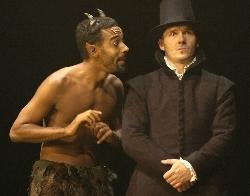Speaking Like Magpies
The Royal Shakespeare Company's 'Gunpowder' season was designed to mark the 400th anniversary of the infamous plot of the same name. The season has included some interesting and intriguing plays, some of them rarely produced and others hardly known to the majority of the theatre-going public. All of the plays in this season were first performed last year at the Swan Theatre in Stratford, and the London season has now reached its conclusion with this new play, 'Speaking Like Magpies', written by Frank McGuinness. Unlike the others in the series, the theme of this play is the Gunpowder Plot itself.
The historical background is that James the VI of Scotland succeeded to the English throne on the death of Queen Elizabeth I. A successful king in his native Scotland, James faced more than he bargained for in his new kingdom. Catholics were looking for greater tolerance, and Protestants anxious not to let them have it. A group of Catholics led by Robert Catesby decided to terminate the King's rule by blowing him up using gunpowder lodged in a basement under the House of Lords, The plot was discovered when one of the conspirators warned a prominent catholic, Lord Monteagle, who promptly reported it to the King's spymaster, Robert Cecil. The plotters were eventually rounded-up, grotesquely tortured and executed in a particularly nasty way.
With explosions, fire-breathing entertainers and fireworks, this play has enough pyrotechnics to provide a veritable feast for aspiring arsonists, and, one suspects, something of a nightmare for the theatre's fireman. Commencing with a long fuse burning its way upstage and through a dark red curtain, there's an almighty explosion creating a massive hole in the red brick wall which has featured in all the 'Gunpowder' plays to date. From the wreckage, a barrel rolls down the stage and we hear a strange crying coming from inside. The Equivocator wriggles out, naked from the waist up and simulated fur from the waist down. Half-man, half devil (complete with horns) Kevin Harvey's rather jolly Equivocator skips around the stage on the balls of his feet, interrogating the other main characters. It's a neat and entertaining device to aid the narrative and draw-out motives, but the character's name also derives from the trial of Jesuit priest, Henry Garnet, who was questioned repeatedly about his 'equivocation' concerning the plot.
After the explosive beginning, the Equivocator introduces us to Mary Queen of Scots who sits astride the body of Queen Elizabeth forgiving her (presumably for Elizabeth having her beheaded). But Elizabeth's body turns out to be James VI of Scotland who's soon brought news from his wife that he's the new King of England. During his progress South to his newly-acquired capital, James meets his new subjects, some wearing masks made of sticks and one dressed as the Pope, complete with a huge nose and stilts! And it's here that we see the unpredictability of the new king, capable of flying into a rage at the 'drop of a hat'. During the remainder of the first half of the play, we're introduced to the plotters as well as the devious, Robert Cecil.
The second half of the play is concerned with the discovery of the Gunpowder Plot, and subsequent events. The torture of the plotters themselves was rather glossed over here, but there were overly long scenes involving the Jesuit priest, Henry Garnet and the maid from the house where Garnet was hiding.
William Houston, who's been cast as the 'bad-guy' in most of this season's plays, takes on the role of King James here - it might be regarded as another 'bad guy' role depending on your point of view. In reality, James I was one of the most intellectual of British kings, and Houston reflects this in his haughty portrayal of the unpredictable monarch who was also terrified of being 'bumped off'.
Period costume is the order of the day in this play, and proves a sensible choice given the historical nature of the material. And there's a substantial amount of excellent singing and fine music.
Although Frank McGuinness provides an interesting 'take' on the events and people involved in the Gunpowder Plot, it's more of a literary work rather than a strictly historical dramatisation of events. Worthy though it is, I think some of the audience may have found parts of the play confusing because of a lack of historical detail and insufficient explanation of the interrelationships. And the second half seemed to drag in comparison with the first, mainly because it focused rather too long on the torture of a maid, and the Jesuit priest, Henry Garnet, for reasons which were rather unclear.
Daring and innovative, the RSC's 'Gunpowder' season has brought us a number of rarely produced and fascinating plays and on that count alone should be judged a success. But there's also been some great acting from a disciplined, creative and accomplished company, which has shown itself both willing to take risks and with the more than sufficient ability to pull them off.
(Peter Brown)
Production photo by Hugo Glendinning
Originally published on
